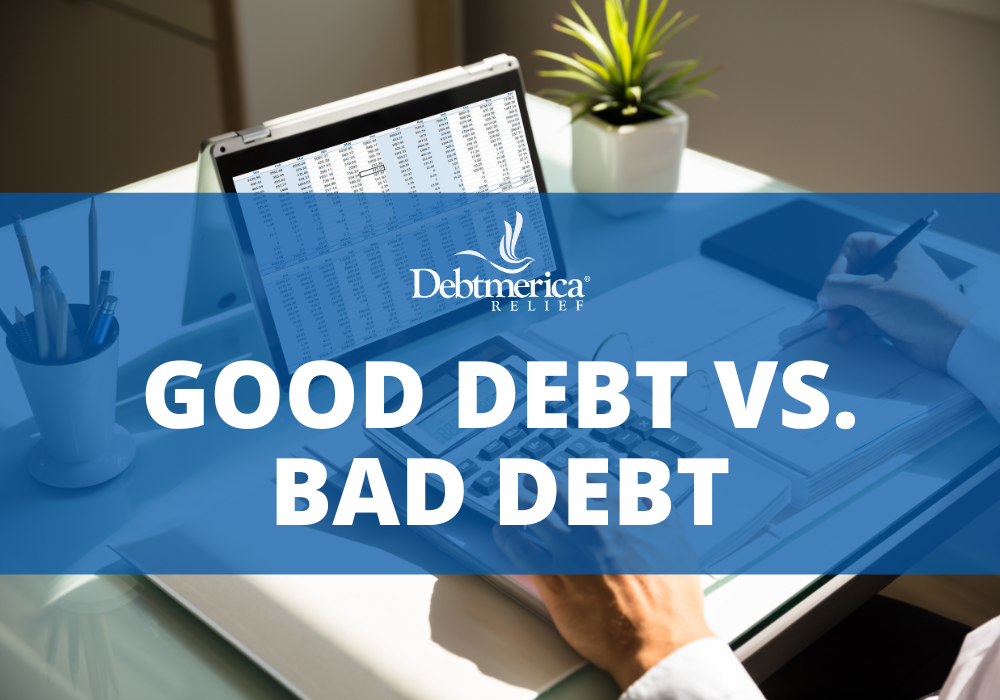Good Debt vs. Bad Debt

It’s not news to many that having debt is a near necessity in the United States. Taking on debt can help build wealth in many instances. But how does one distinguish between good debt and bad debt? What are the key differences between the two? How can you use each of them to your advantage? Put simply, good debt can help you achieve your financial hopes and dreams, and bad debt can do the exact opposite.
What is good debt?
Good debt is essentially any type of debt that can potentially help increase your net worth or provide income. More importantly, it should come with a low interest rate or APR. These debts are viewed as good financial investments.
Education and Student Loans
Because education can enhance your future and potentially result in higher earnings, it is often viewed as a good investment. That said, student loan debt may be considered good debt to many, especially since most offer lower interest rates. While this is the general idea, you should always be practical about the amount you borrow for school. For example, it is better to borrow only an amount that you can realistically pay off with your projected salary. Most experts will agree that your student loan payment should not exceed 10% of your projected net monthly income.
Mortgages
While it will likely be the largest debt account you have, a mortgage can be your most valuable asset. This is true whether you purchase a home to live in, flip for a profit, or rent out for income. That said, a mortgage can help increase your net worth, but knowing how much you can afford is critical. Most modern-day experts will agree that your mortgage payment shouldn’t exceed 28% of your gross monthly income. In addition, your mortgage should not be more than 36% of your total debts, including credit cards, auto loans, and other debts.
Business Loans
Starting a business comes with a lot of risks. If you can manage to start a business with low-interest loans, and then turn a profit, this debt can be considered good. Just be sure to ask yourself if your monthly payments are manageable and if your business will financially grow from this debt.
What is bad debt?
Bad debt is expensive debt that hurts you financially. They typically have high interest rates and might be connected to purchases that quickly depreciate. Keep in mind that bad debt may look like good debt at first and it will be up to you to avoid financial mishaps. For example, if you obtain a mortgage you cannot afford to pay, it can quickly become bad debt. Taking out a loan for a failing business can be another example of good debt turning bad.
Credit Cards
With interest rates usually above 20%, credit cards are some of the most expensive debts you can have. On top of the high interest rates, the low minimum payments can lead many borrowers to keep debt over longer periods of time. While the general rule is to keep your credit card balances below 30% of your credit limit, you should always try to pay off your balance in full each month. If you find it hard to make a dent in your credit card debt, it might be a sign that you have too much to handle.
Car Loans
Believe it or not, car loans are often viewed as bad debt. This is mainly because your new car will lose some of its value the moment you drive it off the dealership lot. In fact, most new cars lose about 20% of their value within the first year after purchase. While experts say that saving up to buy a used car in cash is your best option, this is not always realistic for buyers. That said, if you must go into debt to purchase a car, you should seek an auto loan with low interest. You should also try to purchase a car that holds its value.
Conclusion
It’s important to note that while good debt can have potential benefits, it still requires responsible financial management and repayment. Additionally, the classification of debt as good or bad may vary based on your individual circumstances, financial goals, and risk tolerance. Most importantly, never take on more debt than you can manage. Debtmerica Relief has over 16 years of experience in providing relief to our clients whose debts have become too much to handle. If you need help with debt, give us a call at 800-470-8155 for a free consultation.



